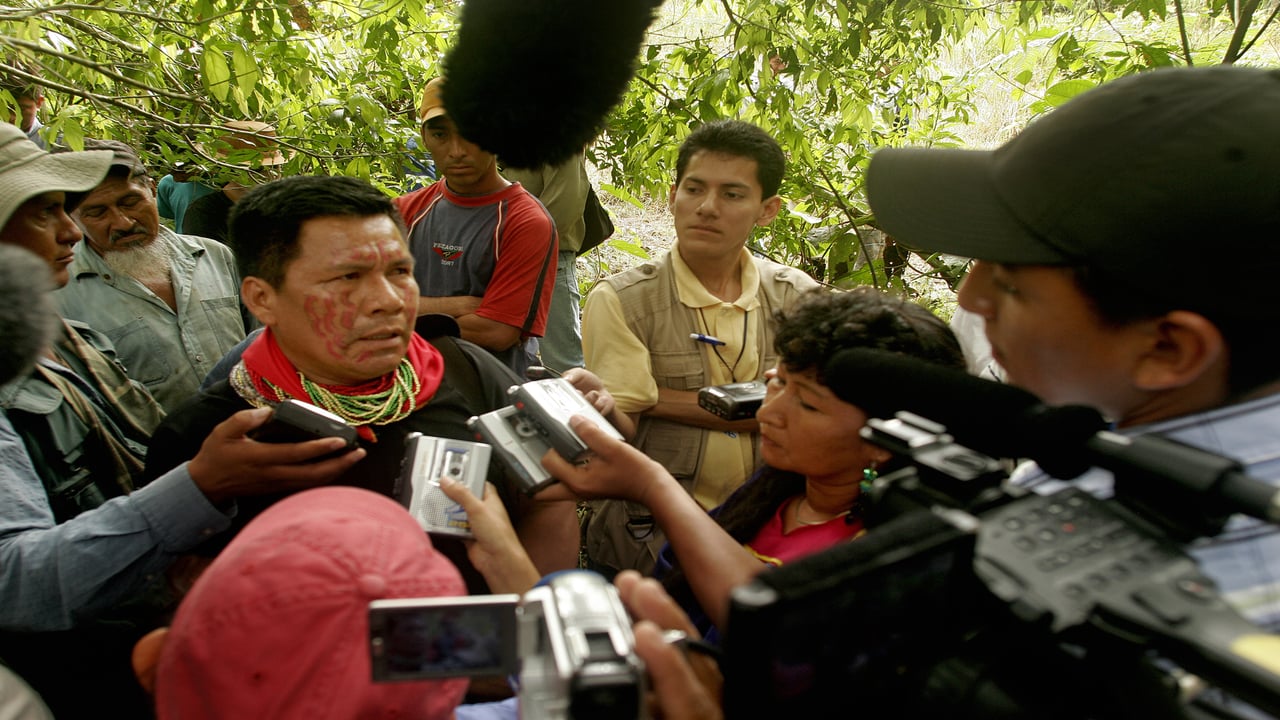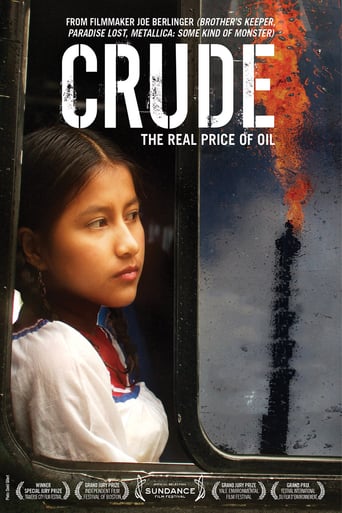



Surprisingly incoherent and boring
Good story, Not enough for a whole film
Dreadfully Boring
It’s fine. It's literally the definition of a fine movie. You’ve seen it before, you know every beat and outcome before the characters even do. Only question is how much escapism you’re looking for.
View MoreJoe Berlinger's "Crude" follows the campaign of several litigators as they work on behalf of the people of Ecuador to win a class action lawsuit against Texaco oil."Crude" begins in 1964, with Texaco's arrival in Ecuador. In 1972 the company begins working in the Lago Agrio oil fields, actions which slowly usurp the lives of the indigenous populace. Over the decades, Texaco leaks toxins and waste into neighbouring rivers, which of course lead to mutations, deaths and disease. Texaco subsequently transforms into a mega-corp called Chevron. Later the Lago Agrio fields are handed over to a company called PetroEcuador.At its best, "Crude" maps a dispiriting, daunting, decades-long campaign against a mega-corporation with seemingly infinite resources at its disposal. Elsewhere Berlinger teases out Chevron's ingrained hypocrisy, several of its spokesmen deeply steeped in denial. The company would later accuse "Crude" of being dishonest propaganda, the documentary's claims based on bribery and coercion. While there is some truth in these claims - Ecuador's government are as complicit as Texaco, and most of the "environmental lawyers" Berlinger shows us are acting wholly out of self-interest - this does not absolve Chevron of blame.8/10 – See "All Watched Over By Machines of Loving Grace".
View MoreOut of the many films that I enjoy enough to place prominently in my Top 100 List, Crude (2009) is the only documentary that makes the cut. It isn't because its subject matter; which focuses on the price of oil contamination on indigenous populations in Ecuador. It isn't because of its cinematography which is beautiful and sympathetic. Finally, it isn't because of its particular political slant. The reason why I find Crude to be superior to all other documentaries is because it presents a very real problem faced by people far away and makes us sympathize with their plight, while acknowledging that things are complicated.Crude is shot between 2006 and 2007 and details the complex and exhausting case of the Lago Argio oil field. Due to multiple spills, bad regulation and poor clean up on the part of Texaco (now Chevron), the area has been dubbed by many as the Amazonian Chernobyl. A class action lawsuit was brought forth by 30,000 Ecuadorians for $27 Billion dollars in 1993. Fourteen years later the case is still tied up in court.As the film progresses, the scene always returns to an investigative study. A judge is being chaperoned by the plaintiff and defending attorneys as they investigate an oil field that has contaminated untold acres of Amazonian jungle. The lawyers present their argument to the judge and a multitude of growing crowds as they dig for soil samples which are excavated up and opened to find ugly layers of coagulated.It is from this point that the documentary feels more like a docudrama. We meet the plaintiff lawyers Pablo Fajardo a smart but inexperienced lawyer from Ecuador and Steve Donziger, a cynical attorney hired from a powerful New York law firm. Lacking the infinitesimal budget of their defendant, Texaco Oil, the plucky lawyers globe trot from Ecuador to New York to London to Houston, all to further their cause. Meanwhile industry experts make the case that Texaco was A: not the polluter but rather Petroecuador a state-owned subsidiary with a poor track record and B: not the liable for health issues the indigenous population is suffering from as there is no connection to petroleum.While there is a admitted bias to the documentary, director Joe Berlinger wisely shows that there are good people and bad people working on both sides of the issue. In one scene lawyer Steve Donziger irreverently prepares a Chacon Indian to speak at a Chevron stockholders meeting by essentially dictating his own statement to him. On the other hand one expert speaking for the Texaco side of things explains that she would not work for a company that knowingly hurts people or the environment. Do we believe her when she says this? Well we want to.Additionally the basis for the court battle is admittedly tenuous as it is fought in the corrupt courts of Ecuador (U.S. judges remanded it out of their jurisdiction). You add in the issues of oil industry nationalization and local politics and you have yourself one hell of a mess.While both sides quarrel life continues to get harder for the locals. One mother sobs as she tells the camera crew about her eighteen-year-old's bout with cancer while she, herself is sick. She tries to raise money by raising chickens but the chickens wonder down to the stream and are poisoned by the water. She desires to be compensated for her medical bills but since the contamination case has been tied up in court for more than fourteen years, she's not hopeful.There are powerful images featured all over the movie which are hard to reason with. Every time an expert is interviewed about the conditions in Ecuador, the scene cuts back to polluted streams and dying wildlife. An indigenous woman sings a song about the destruction she has seen over the years and children are shown with marks and rashes all over their body. Its hard to process and easy to sympathize.I won't disclose the results of the court investigation but keep in mind that the results are non-binding. That means that years of tireless effort and hard work may never bring justice to the people of Lago Argio no matter how many of Sting's entourage bring focus to the issue. Yet the quiet dignity of the Ecuadorian people will remain intact and remembered, partially thanks to the work of Joe Berlinger and Crude.http://theyservepopcorninhell.blogspot.com/
View MoreFrom the March 4 ruling against Stephen Donziger and others by U.S. District Court Judge Lewis Kaplan. (LAP means Lago Agrio plaintiffs):The documentary film called Crude was made because Donziger in 2005 recruited film maker Joe Berlinger to portray the LAPs' case against Chevron. The film featured Donziger quite prominently. Donziger provided Berlinger, cameraman Mike Bonfiglio, and other crew members expansive access to himself, his team and some of its activities for nearly the next three years. The ultimate product, Crude, first was released in January 2009.The Crude team's independence from Donziger and the LAPs' lawyers – to the extent there was any at all – was limited. For one thing, Donziger recruited the film's main source of funding: his former classmate Russell DeLeon. As Donziger wrote: "Russ is funding the case. Russ is funding the movie. And Russ wants to fund more cases and more movies." Through his creation and sole ownership of a production company called Crude Investment, Inc., Deleon contributed approximately 60 percent of the film's total funding.Nonetheless, just as they had done with Cabrera, Donziger and his team attempted to create the appearance that the film was independent, while they controlled or influenced its content from behind the scenes.
View MoreIf you have not seen CRUDE yet, get to the closest theater. It is a near perfect documentary of an incredible story.Filmmaker Joe Berlinger leads us through a tale that combines a legal thriller, an environmental outrage, a cultural crisis, a buddy pic, and even pulls in some rock you out of your seats concert footage. Rarely does any film have so many dimensions delivered in such an effective and riveting package.Following the crusade of an Ecuadorian lawsuit against Chevron for 2 of its 14 years, we are guided by the oddest legal couple you can imagine. Pablo the young, fresh and determined Ecuadorian hero seems at times too young and too nice for the fight he is in. That is until you hear him passionately address the issues of the case. He embodies innocence and tenacity in a very Jimmy Stewart ala 'Mr. Smith Goes to Washington', style. His partner is Steven, a big, bold, brash New York lawyer whose bombastic style is as entertaining as it is effective. We are brought close in to the tragic pollution of a once pristine rainforest, and are moved to tears at the plight of the beautiful ancient peoples devastated by same. From the eco/cultural travesty, to the arcane workings of the Ecuadorian legal system, to the power and ruthlessness of a major multinational corporation, there is so much provocative material in this film that days after the showing, I am still processing, and discussing it.Berlinger's gift in this movie is that he does not deliver a conclusion to the audience, rather he presents both sides of the story and provokes the viewer to real thought on the issues. While it is clear that he sees a moral imperative that Chevron accept responsibility and that the people get help, Berlinger does not beat you over the head with a message movie. He makes you ponder the complexities and own your own opinion. If he ever stops making films, which I hope he does not, he would make a great college professor.Watch for this excellent film to be in the mix at Oscar time.
View More